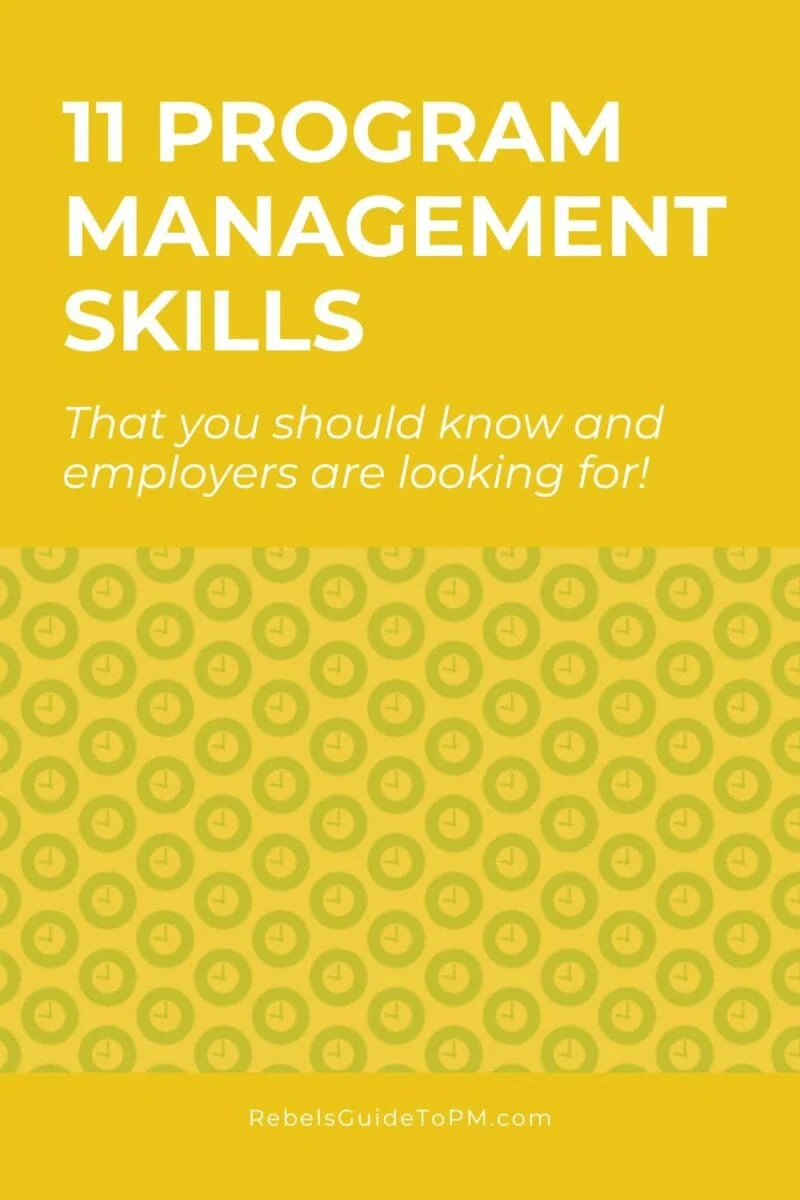11 Program management skills employers expect
Want to make it as a program manager? There are loads of skills you need to succeed.
Let’s face it – there are loads of skills you need in every job, so let’s not overwhelm ourselves. In this article, I’ll share the skills that have been the most useful for me in the role.
I’ve worked as a program manager for a few years now so I can tell you the top program management skills that I use each day. As it happens, they are also the most likely skills you are going to see on a program management job description.
If you’re wondering what program management skills and competencies you should be highlighting on your resume, I’m about to give you a shortcut to showcasing exactly what employers are looking for.
Different types of program management skills
An average salary for a program manager in the US is $137,776, according to PMI’s Project Management Salary Survey—Thirteenth Edition (2023). It can be a very lucrative career, so it literally pays to have the right skills!
However, bear in mind that how far your salary stretches very much depends on where you are based. In the US, there’s a gap of around $60k in terms of cost of living adjustments on salaries, meaning a job in California might pay less in real terms than one in Kansas.
And what skills do program managers need? They need a blend of both technical and soft skills.
Technical skills
Technical skills are what you use to complete tasks that have lower involvement with other people. For example, using your project management software, budgeting and forecasting (although you would involve Finance for that) and scheduling.
These are similar skills to what you would use to manage complex projects.
Interpersonal skills
Interpersonal, or power skills, to use PMI terminology, are arguably more important than technical skills. These are the ones you’ll use talking to stakeholders, working with project teams and collaborating with vendors.
Good program managers have a blend of both, plus business acumen and the confidence to get the job done.
Let me share some specific, key program management skills that should be on your resume if you are job hunting this year.
These are in no particular order!
1. Benefits management
I’ve probably hammered home the role of benefits management and realization enough already in other articles but benefits should always be top of mind.
Are we getting what we planned? How close are we to turning the ideas into tangible outcomes for the organization? Do we have trackable measures and baselines against which to track?
The project goals should lead directly to the realisation of benefits identified in the program business case.
2. Dependency management
Dependency management is one of the top program management skills you’ll need to develop.
Project dependencies are managed by the project managers, but they might escalate up dependencies that you should be managing at the program level, for example those that are between projects in the program.
A big role for the program manager is juggling these so the right people are working on the right projects at the right time and nothing is held up because a dependency was overlooked.
Experience in project management will help here, because it’s basically the same skill as you use when managing dependencies on projects – they are just at a different level.

3. Collaboration skills
A study by KPMG reported that 70% of managers felt that having a capable and experienced delivery team is a key success factor for transformation projects, so being able to create an environment where your team can do their best work is crucial.
You’ll be facilitating cross-departmental collaboration and making sure people on different project teams work effectively together.
4. Governance management
Program governance happens at 3 levels:
Project level
The project manager/project sponsor keeps the individual projects on track and reports progress to you. You’ll make sure that project management processes are being followed, with the support of the PMO.
Project managers would choose the project management methodology that is appropriate for delivery, which means the program may contain projects that use
Program board
The program manager and program board control the program i.e. by deciding on risk management measures, holding projects accountable and tracking progress.
They hold you accountable for the program outcomes.
Organization
Could be the PMO or the executive management – the group that the program manager reports into. This is the corporate level that challenges and holds the program board accountable for delivery.
In addition to these 3 layers, you might have to report into various forums or committees, depending on your organization structure.
5. Reporting
Reporting, as it is with projects, should be a mix of looking forward and looking back. You’re creating program board reports focusing on progress and variances, providing recommendations and decision papers.
At the same time, you’re forecasting forward, looking for trends, seeing off risks and trying to plan ahead. Apply some critical thinking to how you report – your readers don’t need to understand the teeny details of each project so think about what information you are escalating up.
6. Leadership
Leadership skills are really important because program management roles are typically at a more senior level in the PMO than other roles, so you’re setting the tone for the way work gets done.
You might also find yourself mentoring project managers.
7. Stakeholder management
Or stakeholder engagement, as I prefer to call it. Especially at program level, you aren’t managing the behavior and contribution of other people, you are facilitating it.
The role here is to identify stakeholders, ensure they receive the information they need creating an environment where they can contribute in the best way possible.
Project stakeholders, especially senior ones, often have program roles too. For example, project sponsors would sit on your program board. A RACI matrix or roles and responsibilities document would help you make sure roles are defined.
8. Communication
Communication skills are used in every job, including project management, but they are really important for program managers.
You’ll be communicating up to senior executives and the portfolio management team, across to peers and PMO colleagues, and down to team members on individual projects.
The program manager role includes defining and creating a communication plan and establishing the right communication methods (without duplicating anything that is happening at project level).
9. Resource management
Resource allocation happens at lots of layers in a project-based organization. Some of that is going to be at program level.
The challenge I’ve found with resourcing program-level tasks is that they can be seen as bureaucracy. If the projects are running well, why do we need a program manager pulling it all together?
The other aspect to program resource management is making sure each of the projects has the resources they need to progress at the pace you need.
10. Strategic thinking
Being able to see the big picture is important for program leaders. You’ll be linking organizational goals to the work the program is doing and ensuring you stay on track.
It helps you communication progress towards the vision to senior leaders and the team.
It will also help you spot potential risks because at program level, the risks tend to come (in my experience) from external influences.
11. Organizational skills
Effective communication and strategic thinking is going to help you with organizing the work in the program. There’s a bit more to it than project planning because you’ve got to juggle the competing needs of projects.
You’ll be taking each project plan and creating an overarching program plan. Then you’ve got to make sure that everything is tracked and monitored, and under control to the extent that milestones don’t slip and all the component parts of the program work together.

What if you don’t have the skills?
There are 2 schools of thought for what to do if you don’t have the skills required to do the job.
First, you can work to get them. There are plenty of training courses for program managers as well as degree courses. Plus, nothing is better than practical, real-life experience! See what experience you can get in your current role.
The second approach is to recruit to fill your gaps. If you don’t have the skills, maybe you don’t need them. We can’t all be good at everything.
Consider hiring someone who is good at what you are not interested in doing or skilled at. Building a balanced team will mean you’ve got all skills covered, without having to have them all yourself.
Where to next?
There’s a lot more that goes into being a successful program manager, but hopefully that gives you an idea of some of the main things to consider.
What I’ve shared is more than just a list of program management skills. It should be the foundation of your professional development. It will help you identify gaps in your knowledge.
The best program management skills are the ones that are going to give you an edge in getting a job and excelling at the job once you’ve got it.
You’ve got this!
